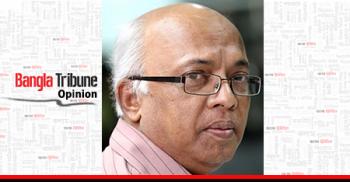 Muhammad Ataul Gani Osmani was 65 when he passed away thirty-four years ago in 1984. In effect, and in terms of longevity, Osmani died a little too early. And yet there is the feeling that he had given his country all he needed to, that indeed by the end of the 1970s there really was little role for him to play. His Jatiyo Janata Party, the political outfit he shaped for himself, was but an extension of himself. It was not expected to outlast him. It didn’t.
Muhammad Ataul Gani Osmani was 65 when he passed away thirty-four years ago in 1984. In effect, and in terms of longevity, Osmani died a little too early. And yet there is the feeling that he had given his country all he needed to, that indeed by the end of the 1970s there really was little role for him to play. His Jatiyo Janata Party, the political outfit he shaped for himself, was but an extension of himself. It was not expected to outlast him. It didn’t.
A not so successful politician Osmani may have been, but more significant was his role as commander-in-chief of the Bangladesh forces during the nine months of the Liberation War in 1971. It was to him that the Mujibnagar government turned for a shaping of guerrilla strategy. Osmani gathered around him the finest of Bengali soldiers of the Pakistan military — Khaled Mosharraf, KM Shafiullah, Ziaur Rahman, MA Manzoor, Abu Taher, AK Khondokar, MK Bashar and others — to help devise the means of shaping and implementing a people’s war against the Pakistan occupation forces. It was Osmani’s finest hour. Only four years into retirement from the Pakistan army, an establishment that would not let him rise above the rank of colonel, Osmani had before him, in 1971, the onerous job, and of course a welcome opportunity, of beating the Pakistan military in battle.
In the event, Osmani won his war and the nation its liberty. A grateful country promoted him to the rank of full general in April 1972. And then, in his new avatar as a minister in Bangabandhu Sheikh Mujibur Rahman’s government, he found an opportunity to bring his sense of discipline and incorruptibility to bear on the workings of the bureaucracy.
Those were heady days and men of calibre and patriotic dedication were all around. Osmani was one of them, a man who easily convinced people of his faith in the power of democracy to change the destinies of nations.
In January 1975, as the Fourth Amendment to the Constitution came to pass, Osmani discerned a palpable threat to democracy. In his emotional farewell to the Jatiyo Sangsad, he left his colleagues in no doubt about the pain he felt. He had seen Ayub Khan, said he, which was why he had little desire to see a Mujib Khan. He relinquished his seat in parliament and slipped into silence. That single act enhanced the respect the nation had always had for him.
Perhaps he ought to have remained in that state. Ironically, for him and unfortunately and embarrassingly for the nation, Osmani accepted in mid-August 1975, with alacrity, Khondokar Moshtaque Ahmed’s offer to be his defence advisor.
That was certainly not his finest hour, seeing that for close to three months after the assassination of the Father of the Nation he served a usurper government. He exercised no authority over the assassin-majors and colonels. No sign of a return to civilised rule was there in Osmani’s attitude to the usurper regime. He was part of that regime. That phase ended on Nov 3 when the killer majors and colonels, along with Moshtaque and his team, were bundled out of Bangabhaban.
Osmani would not return to the limelight until mid-1978 when, as the presidential candidate of the combined opposition (ironically, the Awami League was his main backer), he challenged General Ziaur Rahman, his former subordinate, at the presidential election the dictator had called.
Together with other opposition figures, Osmani made a pilgrimage to the grave of Bangabandhu in Tungipara. At a time when Zia and his rightwing band of supporters held sway over the country, Osmani could not expect to win. He didn’t.
In the six years that remained of his life, General Osmani may not have become irrelevant in Bangladesh’s history. But he was increasingly sidelined by a new generation of politicians and military officers asserting its presence on the national canvas.
His Jatiyo Janata Party made little impact on politics. And he was quite unable to persuade citizens into believing that he had indeed transformed himself into a politician. The old military demeanour was seemingly always there. But the hauteur, the gruff voice, the intimidating moustache in effect concealed an individual who had his heart where it needed to be.
Remembering MAG Osmani is a journey back to the study of a generation that has etched its story amidst the stars. We speak of the leadership that showed us the path to freedom. It was leadership which stayed with us till we arrived at the little hut, bathed in the glow of liberation, at the end of a hard twilight struggle.
(General Muhammad Ataul Gani Osmani was born on Sep 1, 1918 and died on Feb 16, 1984)
Syed Badrul Ahsan is the Editor-in-Charge at the Asian Age


